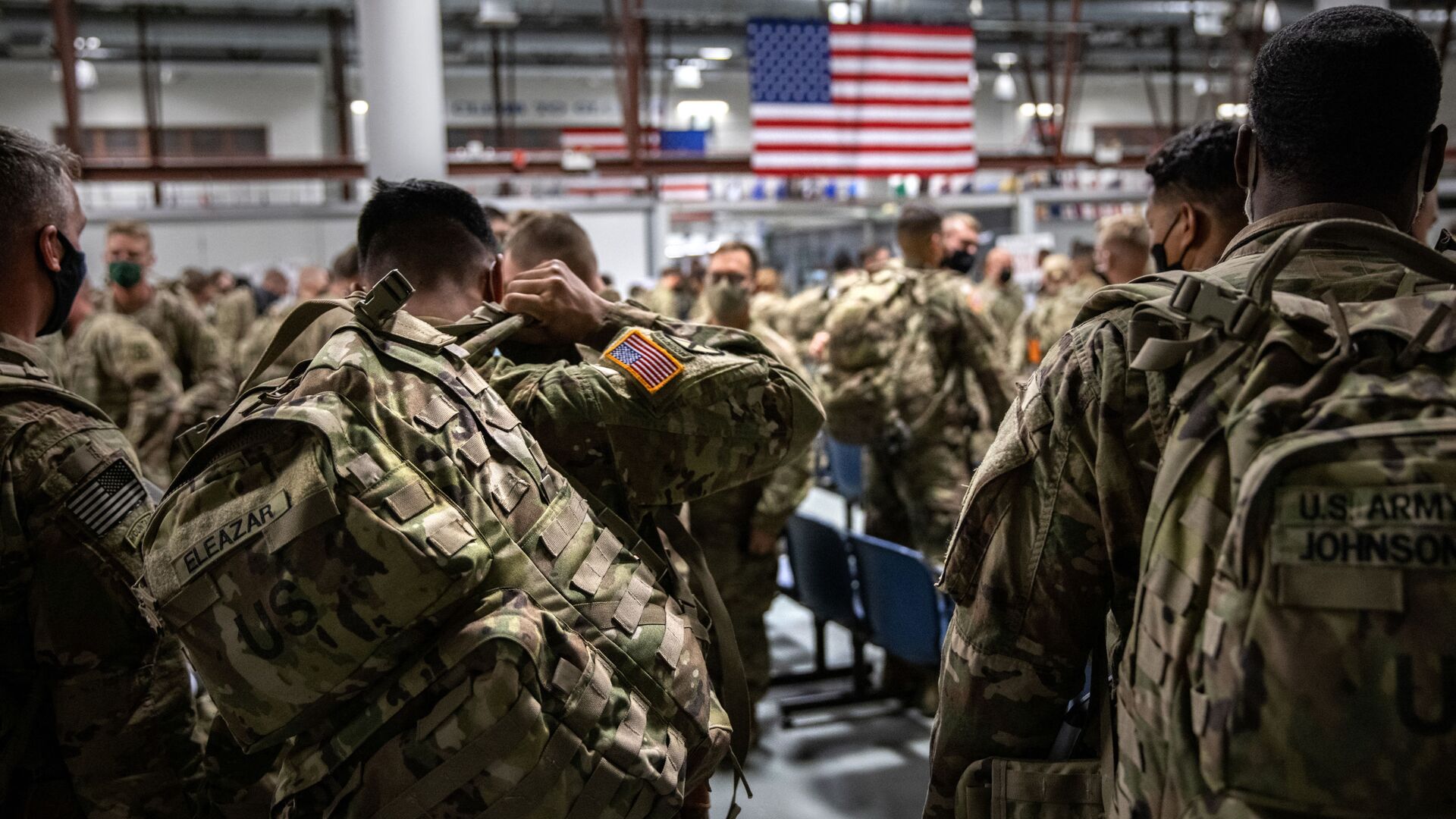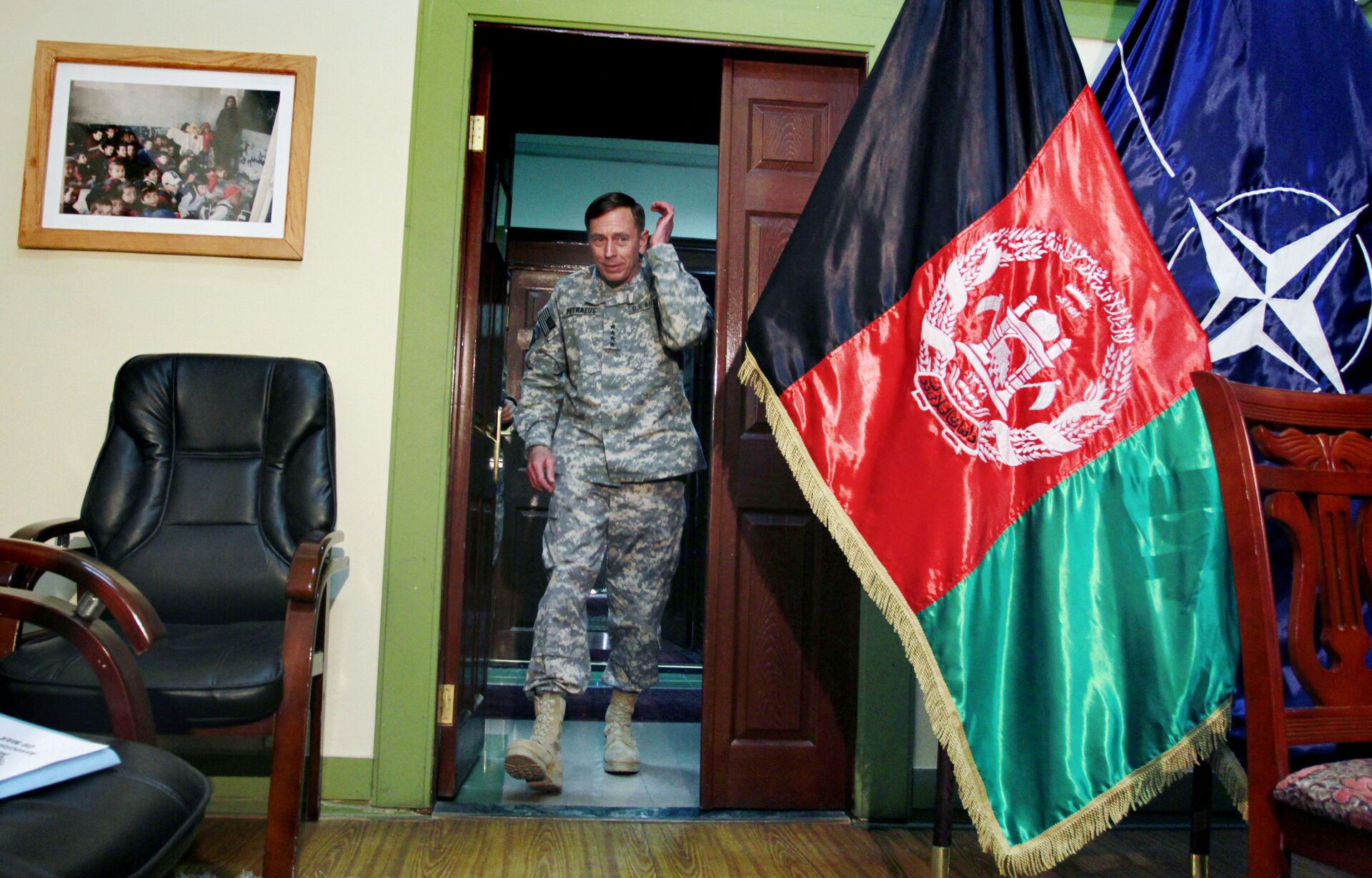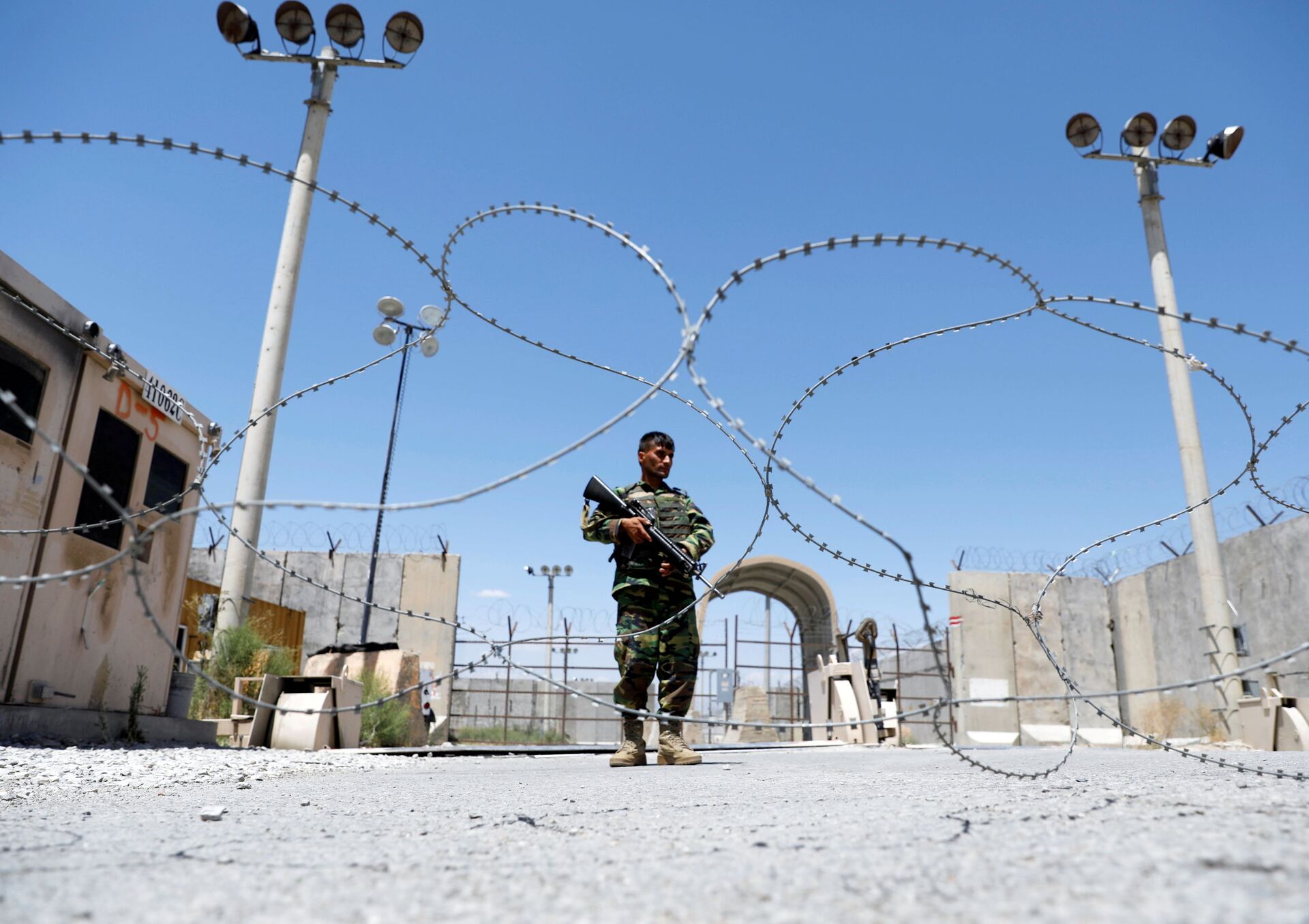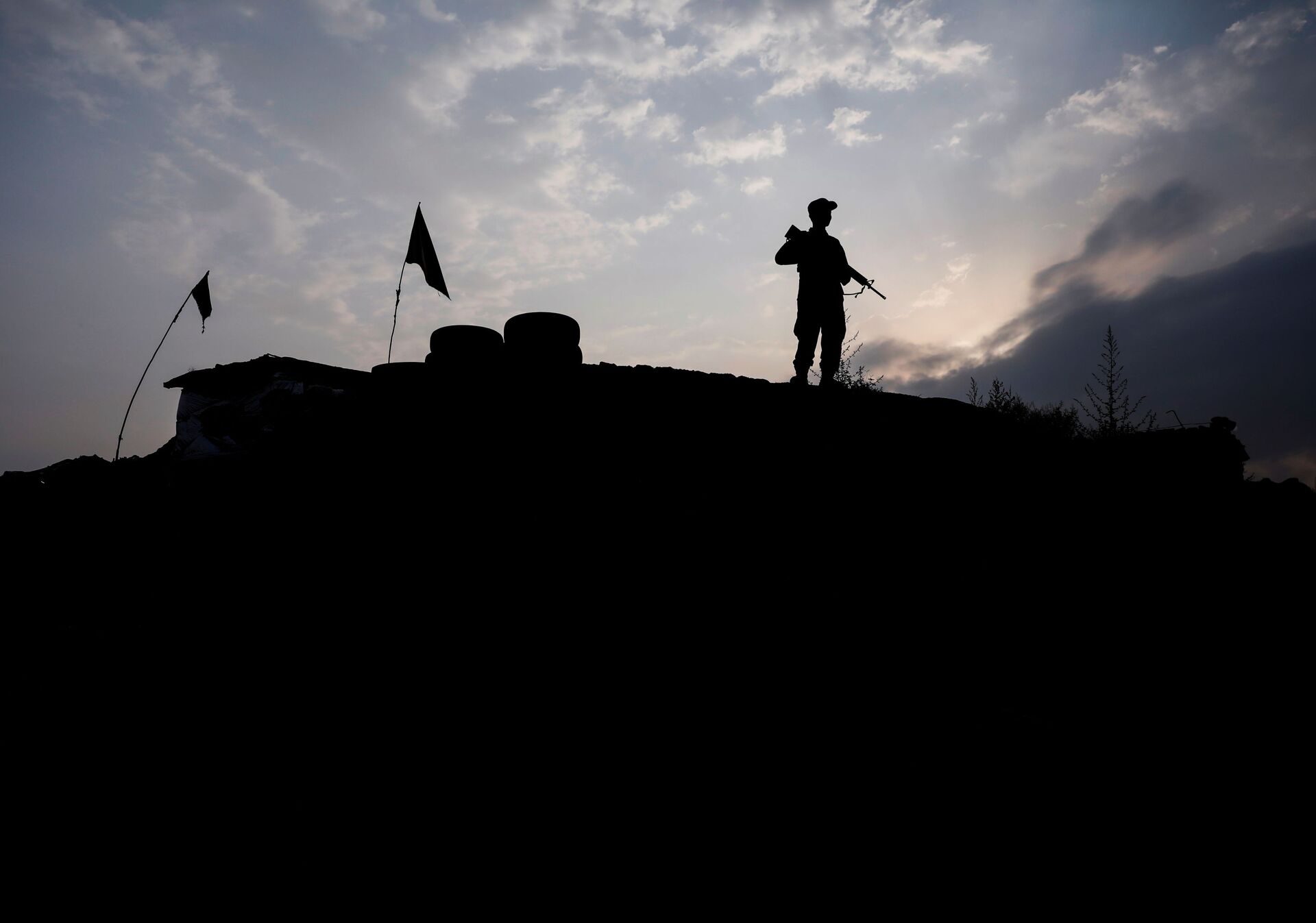US Ditching Afghanistan to Face 'Brutal Civil War' With 'Islamist Takeover' Likely, Warns General
05:47 GMT 02.08.2021 (Updated: 08:21 GMT 02.08.2021)

© AFP 2023 / JOHN MOORE
Subscribe
Amid the withdrawal of US and NATO troops from Afghanistan, retired Army General David Petraeus earlier predicted that Washington may come to regret its decision to pull troops out of the South Asian nation, warning that the Taliban group was likely to gain an increasing foothold there.
Former commander of US and NATO troops in Afghanistan General David Petraeus believes that by withdrawing its forces from the country after nearly 20 years, America has abandoned the South Asian nation to face a “bloody, brutal civil war”.
General Petraeus was cited by The Times as highlighting the dangers of an Islamist takeover in the country in the wake of the pullout, set to be completed by the end of the month after nearly 20 years in Afghanistan.
‘Worst-Case Scenario’
Weighing in on the dramatic surge of violence in Afghanistan, where the Taliban* militant group has been laying siege to Kandahar, the nation’s second-biggest city, Lashkar Gah, capital of Helmand province, siting on strategic routes such as the highway between Kandahar and Herat, a city in the west of the country, General David Petraeus was quoted as saying:
“The worst-case scenario is we could see a bloody, brutal civil war similar to that of the 1990s, when the Taliban prevailed.”

In this Wednesday, March 9, 2011 file photo, Gen. David Petraeus, then top commander of U.S. and NATO forces in Afghanistan, arrives for an interview at the NATO's head quarter in Kabul, Afghanistan.
© AP Photo / Musadeq Sadeq
Afghanistan has witnessed a dramatic rise in violence as US and coalition troops are gradually being withdrawn from the country amid the Taliban’s push for reclaiming territory.
“The rest of the world will see that we are not supporting democracy or maintaining the values that we promote around the world — human rights, particularly women’s rights, the right to education and freedom of speech and press — all very imperfect in Afghanistan, to be sure, but vastly better than if the Taliban reinstates a medieval Islamist regime,” continued Petraeus.
The retired general warned that if the Taliban group continued to gain clout across the South Asian nation it might facilitate the return of al-Qaeda* terrorists.
“If that were to happen we would likely see the return of an al-Qaeda sanctuary, although I don’t think AQ would be able to threaten the homeland and Europe in the near-term. And certainly, our intelligence services and military will be watching for that,” he said.
He added that the Taliban onslaught, which was already forcing thousands of Afghans to flee, would result in a vast flood of refugees streaming into Pakistan and other neighboring countries. He also underscored the potential dramatic reductions in freedoms for Afghan citizens, particularly women, in the event that the Taliban claim control, saying: “I don’t think this is what the world wants to see.”
‘Stronger Negotiating Position’
The retired general, who in late July predicted in an interview with Fox News that Washington may regret its decision to withdraw forces from Afghanistan “sooner rather than later”, reiterated his concern over the fact that America was ending its military involvement in the volatile country.
“If we had shown the determination and will to stay, we would have been in a much stronger negotiating position with the Taliban. But if we tell the enemy we are going to leave [which US negotiators stated in “peace” talks with the Taliban in Qatar in 2020], why would they give up anything?”
With unabated violence continuing in Afghanistan for several weeks now, General David Petraeus expressed puzzlement over why Washington didn’t saw fit to maintain 3,500 troops to “stop the Taliban from bringing back an ultraconservative Islamist theocracy which is not in anyone’s interest.”
He argued his case, pointing to the example of Iraq, where President Joe Biden had opted to maintain up to 2,500 US troops, albeit not in a combat role, to help the Iraqi security forces “keep an eye on the insurgent and terrorist cell remnants of the Islamic State*.”
As the Taliban, capitalizing on their rural gains of ostensibly up to half of all Afghanistan's territory, now seek to lay claim to a provincial capital, US air strikes have reportedly targeted the group’s positions, using armed Reaper drones, as well as fighter aircraft from Qatar and the United Arab Emirates.
According to the general, however, it would have been wiser for America to retain Bagram and Kandahar airbases.

An Afghan National Army soldier stands guard at the gate of Bagram U.S. air base, on the day the last of American troops vacated it, Parwan province, Afghanistan July 2, 2021.
© REUTERS / Mohammad Ismail
“The US may try to continue providing air support. Now, we have to fly from the Gulf, we can’t fly over Iran, so we have to go over southwest Pakistan. We’re not going to get a base in Pakistan,” the general was quoted as saying, adding that much hinged on whether the Afghan air force will be able to continue flying.
“The Afghan air force requires highly trained mechanics and supply chains and logistical support or they will not be operationally capable,” he pointed out.
While Afghan government forces claim the that dozens of militants have been killed in the strikes, looking ahead, Petraeus suggested that current developments pointed to a grim scenario where war in Afghanistan would continue, with the situation only getting “much worse.”
“We forced the Afghan government to release thousands of Taliban prisoners, and got little or nothing for it. But if we had 3,500 troops there to maintain situational awareness and help our Afghan partners, we would have been in a position to prevent the Taliban from bringing civil war to the country.”
‘Existential Crisis’
The statements by the retired American general come as at least 20 people, including some civilians, have died and another 90 sustained injuries during the last four days of ongoing fighting with the Taliban in the Afghan city of Herat, and its outskirts, reported Tolo News.
Over the weekend, national media reported that Taliban fighters had seized the outskirts of Herat, moving into downtown areas.
د هرات ښار په سوېل کې د ګازو پر یوه ټانکر د توغندي د لګېدو په پایله کې دغه ټانکر اور اخیستی دی. pic.twitter.com/Cm0qErUvw7
— TOLOnews (@TOLOnews) August 1, 2021
The Afghan TV channel says local authorities have reported "severe casualties" among the Taliban. On Sunday, the government sent reinforcements to the city of Herat, announcing a large-scale operation against the Taliban in the region. Fighting is raging around the three major cities in south and west Afghanistan, Herat, Lashkar Gah and Kandahar.

An Afghan police officer keeps watch at the check post on the outskirts of Kabul, Afghanistan July 13, 2021.
© REUTERS / MOHAMMAD ISMAIL
In Lashkar Gah, insurgents were pushed back after reportedly advancing to just a few hundred metres away from the governor's office on Saturday.
In April, after US President Joe Biden announced plans to begin the final withdrawal of American forces, effectively the ending US’ longest war, the decision had been met with scepticism from experts. They warned that the situation could potentially spiral out of control in Afghanistan.
Earlier this month retired Army Gen. David Petraeus, who commanded NATO forces in Afghanistan, said the White House will regret its decision to withdraw from the country.
A report by Special Inspector General for Afghanistan Reconstruction (SIGAR) John Sopko on 29 July argued that the Taliban’s success in regaining territories from government forces could create an “existential crisis” in the country.
*Al-Qaeda, Islamic State [Daesh/ISIS] and Taliban are terrorist groups banned in Russia and many other countries.

